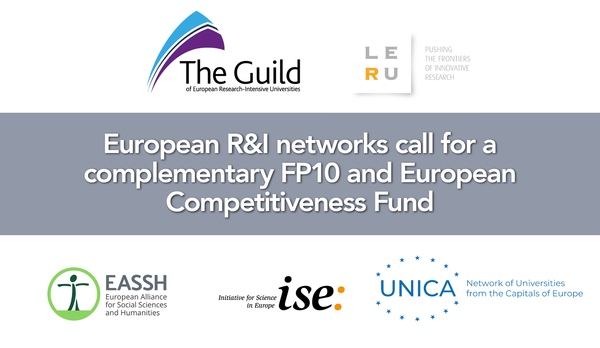European R&I networks call for a complementary FP10 and European Competitiveness Fund

The paper aims to implement the declarations made by European Commission (EC) President Ursula von der Leyen.
EASSS, LERU, The Guild and other research and innovation networks urge for FP10 and the ECF to be developed as two clearly distinct EU instruments both legally and financially since they will aim for and fund different activities, mobilize different funding instruments with different rules, and have (at least partly) different beneficiaries.
Although distinct, they should also be complementary: FP10 should have a clear focus on funding R&I, and R&I only, while the ECF should facilitate deployment and commercialization of these R&I activities. To guarantee that both EU instruments connect where deemed most useful, the signatories recommend the development of a number of clear linkages between FP10 and the ECF, including challenge managers. These experts will identify the most promising innovations for Europe's competitiveness and ensure that they receive support from ideation up to their scaling-up from FP10 and the ECF, as relevant. As part of the simplification efforts, we also identify instruments that should be discontinued (at least under FP10) because of their lack of effectiveness.
While complementarity between FP10 and the ECF will be crucial, this should not lead to a pure instrumentalization of R&I for competitiveness and industrial policy objectives. The paper highlights why it is necessary, also for Europe’s competitiveness, that bottom-up instruments like the European Research Council (ERC), the Marie Skłodowska Curie Actions (MSCA) and some parts of the European Innovation Council (EIC), maintain their purely curiosity-driven nature. Any directionality in these instruments must be avoided. The paper also makes a strong plea for maintaining and reinforcing funding for pre-competitive, collaborative R&I in FP10, geared towards industrial competitiveness but also towards societal progress. We need to mobilize all disciplinary perspectives to maximize our capacity to support society and address its critical challenges.
Quotes
Gabi Lombardo, EASSH Director, states:
“To maintain Europe’s global leadership, we need ambitious funding that puts social sciences and humanities researchers in the driving seat. Their critical interdisciplinarity provides the evidence and knowledge that underpin cross-border cooperation, strengthen our service sector and creative industries, and shape innovation and effective policies. These disciplines are not just complementary – they are foundational for Europe’s competitiveness and strong institutions.”
Prof. Kurt Deketelaere, Secretary-General of LERU, states:
“Cutting research funding, scrapping research topics, steering research policy along ideological lines, reviving the so-called ‘Gold Standard Science’—these are harmful trends currently seen in the USA, and the EU should avoid following this path. Instead, Europe must stay the course it has successfully pursued for the past 40 years: strong, self-standing, and increasingly well-funded Framework Programmes for research and innovation. These programmes should continue to strike the right balance—between basic and applied research, between innovation and scientific inquiry, between top-down priorities and bottom-up initiatives. They must uphold excellence across all funding instruments, remove barriers to the free flow of knowledge and researchers, place R&I at the heart of Europe’s economy, and deliver tangible economic and societal benefits. That is why we need more funding—and less political steering. If a European Competitiveness Fund (ECF), closely linked to FP10, helps support and complement this approach, we will welcome it with open arms.”
Prof. Jan Palmowski, Secretary-General of The Guild, states:
“We are at a crucial moment, as the forthcoming MFF must implement President von der Leyen’s vision to put R&I at the heart of Europe’s future. This requires that FP10 maximises the capacities of cutting-edge researchers and innovators to deliver – and a Competitiveness Fund to scale up R&I discoveries for the benefit of Europe’s societal welfare and economic competitiveness. Our proposals offer concrete ideas, based on the experience of our researchers and innovators on what works, and support the Commission’s drive to simplification, effectiveness, and global leadership.”
Signatories include: EASSH, Initiative for Science in Europe, LERU, The Guild, UNICA Network.